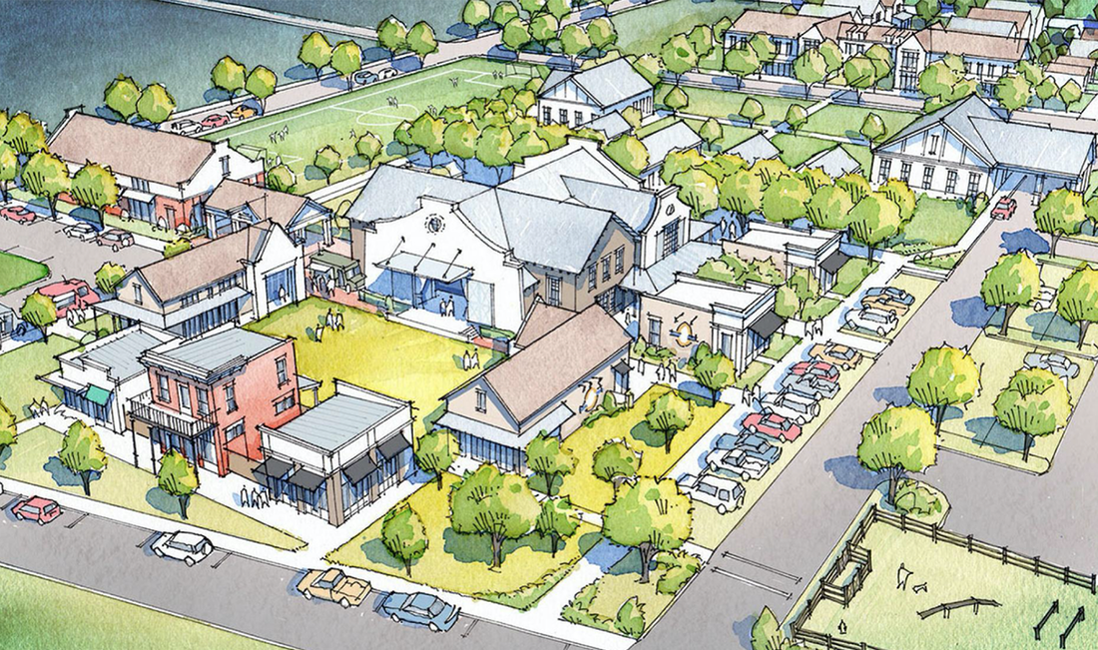Many churches have partnered with faith-based non-profit housing organizations to provide affordable housing on their property.
First Congregational United Church of Christ | Longmont, CO |
Back in the 1960s the First Congregational United Church of Christ in Longmont, Colorado acquired a residence next door to the church. They didn’t need it for a parish house. They thought, in time, they would tear it down for a parking lot. Some fifty years later the house still stood, sometimes used for youth group meetings, sometimes for other purposes. Until a parishioner thought that using the land occupied by the house for parking would free up another part of the church property that could be used for affordable housing.
They got the property re-zoned on their own and then, with the help of Radian Inc and the Congregational Land Campaign of the Inter-faith Alliance in Denver, deeded it over in 2018 to Inn Between, a local faith-based non-profit housing organization specializing in transitional and permanent supportive housing. The quarter-acre plot is now under development, with six micro-units ranging from 425 to 650 square feet. The units, done in a modernist style, are arranged in attached rows of three, facing each other along a common courtyard. A common meeting room, with laundry facilities, is also included in the mix. The accommodations are intended for the elderly and disabled people on limited incomes at 30% of Area Median Income or below. About 40% of the funding for the project came from Boulder County Worthy Cause fund, drawn from local sales tax. The remaining 60% comes from donations and low-cost financing from the city of Longmont’s Affordable Housing fund. |
Discovery Christian Church | Broomfield, CO |
.The main sanctuary of Discovery Christian Church is sometimes lovingly referred to as “the barn.” At present, it sits alone on 19.5 acres of land, acquired around 2013, in the edge city of Broomfield, Colorado, just north of Denver. An independent church, Discovery Christian Church is rooted in the Restoration Movement born during the Second Great Awakening of the early 1800’s in the United States. In seeking to love God and serve others, the church puts a priority on “moving towards our local and global neighbors.”
Discovery’s statement on its defining values explains the motive behind that part of its mission: “Jesus teaches us how deeply he loves and cares about the vulnerable. He calls us to reflect the same concern, sacrificing for those who live on the margins of our local and global communities. This call drives us to come alongside our local and global neighbors sharing the love of Christ through our resources of time, gifting, and money, sacrificing our preferences for the sake of lost and broken people outside of our church. As we move towards our local and global neighbors seeking to bless them, and unexpected thing happens, we become the blessed and the educated.” “Moving towards the neighbor” at the margins of society informs Discovery’s plans for the future development of its generous campus. But in this case, the church will be moving towards its neighbors by moving its neighbors towards the church. It will be leasing two acres of its property to Habitat for Humanity for $1 a year. Four triplex units for the accommodation of low-income households are scheduled for construction. One of the units will be case managed for those in need of counseling and support. |
|
Some people of faith in the urban design community have suggested the development of wholistic neighborhoods on large church campuses. See CNU-MCC member Nathan Norris’s essay on Re-designing Church for the 21st Century.
Image courtesy of CityBuilding Partnership and Thompson Placemaking |
